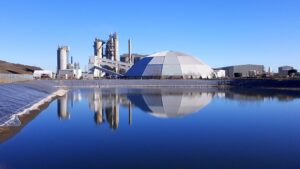
Heidelberg making headway on Edmonton CCUS project
By Adam Freill
Concrete Construction Construction MaterialsHeidelberg Materials North America hits significant milestone as it selects Technip Energies for front-end engineering and design contract.
Heidelberg Materials North America says it has hit a significant milestone in its two-stage competitive procurement process for its Carbon Capture, Utilization and Storage (CCUS) project in Edmonton. The project will be the first full-scale application of CCUS in the cement sector.
Technip Energies, an energy-focused engineering and technology company, has been awarded a front-end engineering and design (FEED) contract for the carbon capture technology. Powered by Shell’s CANSOLV CO2 capture system, the Technip Energies solution, which will be the basis of the FEED study, is based on regenerable amine technology.
“We are excited to take this latest step in our journey to produce the world’s first net-zero cement,” said Joerg Nixdorf, vice-president of cement operations in the Northwest Region for Heidelberg Materials North America. “With each milestone we come closer to realizing our vision of leading the decarbonization of the cement industry.”
“We are pleased to have been selected by Heidelberg Materials North America to provide the FEED of this ground-breaking project in Canada,” said Christophe Malaurie, senior vice-president of decarbonization solutions for Technip Energies. “We are committed to supporting the decarbonization of the cement industry and Heidelberg towards the production of net-zero cement.”
Heidelberg Materials North America is aiming to commission the world’s first net-zero cement plant at its Edmonton location by adding CCUS technology to an already state-of-the-art facility. According to the company, the plant will eventually capture and store an estimated 1 million metric tons of carbon dioxide each year, which is the equivalent of taking 300,000 cars of the road annually. Subject to finalization of federal and provincial funding agreements, the company anticipates carbon capture to begin in late 2026.





